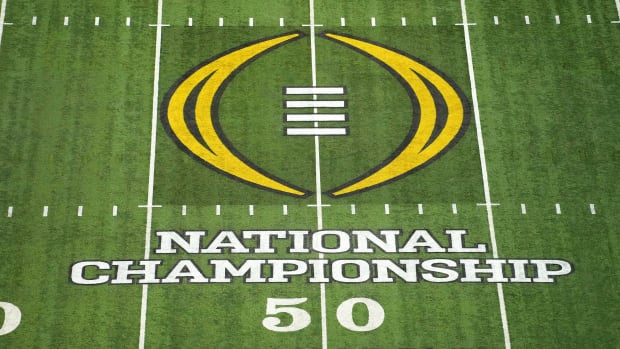On the eve of Week 1 of the 2022 college football season, a group of school presidents and chancellors asserted their control over a College Football Playoff expansion process that at the time was dormant. The board of managers directed the CFP’s management committee (the 10 conference commissioners and Notre Dame’s athletic director) to figure out how to expand the Playoff by ’26 at the very latest (the season in which a new television agreement would take effect). The commissioners will meet again in Dallas on Thursday to continue the work and see how feasible it is to expand even earlier than that, and the optimism expressed in September about that possibility remains.
“We sort of never know until we get into the meetings what the end is going to be,” CFP executive director Bill Hancock says. “But I know the commissioners are working really hard to get to expand the Playoff in 2024. There’s a resolve in the room that I certainly wasn’t feeling a year ago.”
Hancock echoed comments made by ACC commissioner Jim Phillips to ESPN at his conference’s men’s basketball media day Oct. 12. There is often frustration from fans and media that it seems like progress is being made or discussed, only for the meetings to conclude without anything concrete being announced. Hancock cautions that this is all part of how it works.

Kirby Lee/USA TODAY Sports
“It's a process and it’s normal for boards to vet ideas and take their time in vetting and ask[ing] questions, make a list of next steps for the next meetings,” Hancock says. “All that is completely normal. The one thing that changed our meetings over the last year has been the interest of fans that has been shown through the interest of the media. But this is absolutely normal, it happens all the time. People take their time and people want answers immediately. I understand instant gratification, but sometimes the stew has to cook a little bit.”
Hancock says that there is no firm deadline for potential early expansion to be finalized, but acknowledges that “we need to get it done right, but time is not on our side.” Hancock has said previously that all cities awarded a national title game were awarded their games based on current dates with no caveats at the time for a date change. But it is recognized that a decision needs to be made and announced relatively soon, if not at the Oct. 20 meeting. Once a championship game is two years away, CFP representatives begin making a few dedicated visits to the host city. Then, one year out, the meetings become monthly. Houston will host the title game after the 2023 season, and expanding the Playoff in time for that championship game is not feasible.
Representatives involved with hosting the championship games in Atlanta (following the 2024 regular season) and Miami (’25) tell Sports Illustrated they are in a “holding pattern” until the CFP makes a call. Atlanta is referred to as Year 11 and Miami Year 12, referencing the years of the initial 12-year CFP contract.
“We’ve done some initial due diligence, but we can’t do anything until they give us concrete direction as to dates and all that,” Orange Bowl CEO Eric Poms says. “I think both communities are following a parallel track to each other. Until they decide on dates and times, it’s hard to really engage partners in your respective communities that are part of it, because they need to know. Everyone’s acclimated to the potential, but we’re in a holding pattern until the CFP decides something.”
Poms wouldn’t say definitively whether Miami could accommodate a date change off of the announced Jan. 5, 2026, title game. But the president of the Atlanta Sports Council, Dan Corso, was clear about the year before: “We’ll be ready in any way that they go if they go.” For now, the plan is Jan. 6, 2025, in Atlanta, where the city will become the first repeat host of a CFP title game.
Atlanta in particular is a busy convention city, and if it’s determined that the game can’t be played there after all if the date is moved, the commissioners could opt to leave the Playoff at four teams for Year 11 (the 2024 season) and expand in Year 12 instead. Moving a title game’s date involves altering plans for a stadium and hotels for the game day itself, but there are other considerations for events surrounding the game, like fanfests, concerts and private parties. It’s not even just the sports commissions working with the CFP; both cities’ convention bureaus, for instance, are integral in planning these events. Both cities and stadiums are also readying for a potential date change to impact their traditional bowl games and their date in a semifinal rotation if needed.
It is doubtful the title game will move off of Monday night whenever expansion does land. Adding two rounds to the event with around 12 days of rest after conference championship games (currently the first weekend of December) squeezes the time frame to play the entire Playoff—unless the title game moves deeper into January. NFL wild-card Monday would be Jan. 13, 2025, and Jan. 12, 2026, so to keep a Monday-night title game, either the game would need to move much later in the month, to the Monday after the NFL’s divisional round, or the regular season would have to bump up a week from the current Week 1 (Labor Day) to Week 0. That would see the regular season end the weekend before Thanksgiving and turn Thanksgiving weekend into conference championships. That reality is being discussed inside the room as well and would create its own set of difficulties. Nothing is easy when it comes to Playoff expansion, but a resolution can’t stew for much longer.







